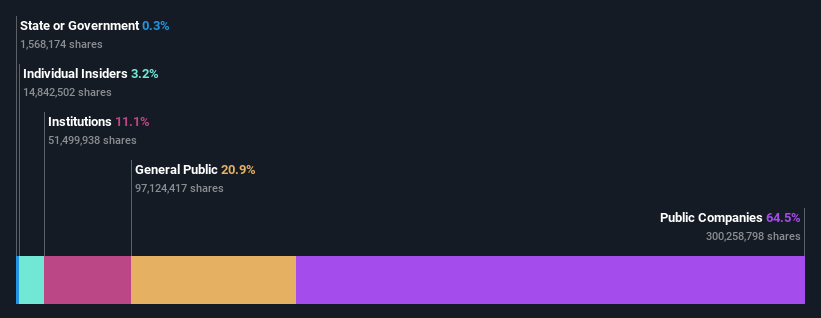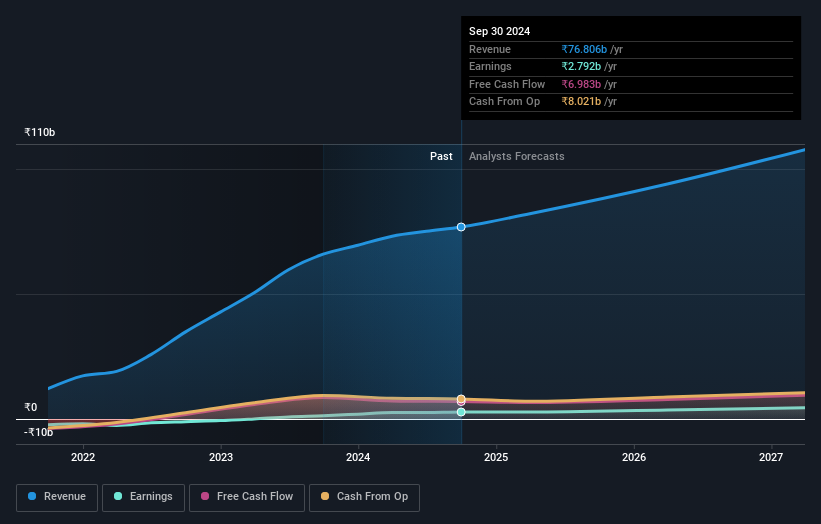- India
- /
- Hospitality
- /
- NSEI:THOMASCOOK
Public companies are Thomas Cook (India) Limited's (NSE:THOMASCOOK) biggest owners and were rewarded after market cap rose by ₹6.3b last week
Key Insights
- Significant control over Thomas Cook (India) by public companies implies that the general public has more power to influence management and governance-related decisions
- Fairfax Financial Holdings Limited owns 65% of the company
- Insiders have been selling lately
If you want to know who really controls Thomas Cook (India) Limited (NSE:THOMASCOOK), then you'll have to look at the makeup of its share registry. The group holding the most number of shares in the company, around 65% to be precise, is public companies. In other words, the group stands to gain the most (or lose the most) from their investment into the company.
As a result, public companies were the biggest beneficiaries of last week’s 6.7% gain.
In the chart below, we zoom in on the different ownership groups of Thomas Cook (India).
See our latest analysis for Thomas Cook (India)

What Does The Institutional Ownership Tell Us About Thomas Cook (India)?
Many institutions measure their performance against an index that approximates the local market. So they usually pay more attention to companies that are included in major indices.
As you can see, institutional investors have a fair amount of stake in Thomas Cook (India). This can indicate that the company has a certain degree of credibility in the investment community. However, it is best to be wary of relying on the supposed validation that comes with institutional investors. They too, get it wrong sometimes. If multiple institutions change their view on a stock at the same time, you could see the share price drop fast. It's therefore worth looking at Thomas Cook (India)'s earnings history below. Of course, the future is what really matters.

Hedge funds don't have many shares in Thomas Cook (India). Our data shows that Fairfax Financial Holdings Limited is the largest shareholder with 65% of shares outstanding. This essentially means that they have extensive influence, if not outright control, over the future of the corporation. With 2.9% and 2.0% of the shares outstanding respectively, Aditya Birla Sun Life AMC Limited and Nippon Life India Asset Management Limited are the second and third largest shareholders.
While studying institutional ownership for a company can add value to your research, it is also a good practice to research analyst recommendations to get a deeper understand of a stock's expected performance. Quite a few analysts cover the stock, so you could look into forecast growth quite easily.
Insider Ownership Of Thomas Cook (India)
The definition of an insider can differ slightly between different countries, but members of the board of directors always count. Company management run the business, but the CEO will answer to the board, even if he or she is a member of it.
Most consider insider ownership a positive because it can indicate the board is well aligned with other shareholders. However, on some occasions too much power is concentrated within this group.
We can report that insiders do own shares in Thomas Cook (India) Limited. The insiders have a meaningful stake worth ₹3.2b. Most would see this as a real positive. Most would say this shows alignment of interests between shareholders and the board. Still, it might be worth checking if those insiders have been selling.
General Public Ownership
The general public, who are usually individual investors, hold a 21% stake in Thomas Cook (India). This size of ownership, while considerable, may not be enough to change company policy if the decision is not in sync with other large shareholders.
Public Company Ownership
We can see that public companies hold 65% of the Thomas Cook (India) shares on issue. It's hard to say for sure but this suggests they have entwined business interests. This might be a strategic stake, so it's worth watching this space for changes in ownership.
Next Steps:
I find it very interesting to look at who exactly owns a company. But to truly gain insight, we need to consider other information, too.
Many find it useful to take an in depth look at how a company has performed in the past. You can access this detailed graph of past earnings, revenue and cash flow.
If you are like me, you may want to think about whether this company will grow or shrink. Luckily, you can check this free report showing analyst forecasts for its future.
NB: Figures in this article are calculated using data from the last twelve months, which refer to the 12-month period ending on the last date of the month the financial statement is dated. This may not be consistent with full year annual report figures.
Valuation is complex, but we're here to simplify it.
Discover if Thomas Cook (India) might be undervalued or overvalued with our detailed analysis, featuring fair value estimates, potential risks, dividends, insider trades, and its financial condition.
Access Free AnalysisHave feedback on this article? Concerned about the content? Get in touch with us directly. Alternatively, email editorial-team (at) simplywallst.com.
This article by Simply Wall St is general in nature. We provide commentary based on historical data and analyst forecasts only using an unbiased methodology and our articles are not intended to be financial advice. It does not constitute a recommendation to buy or sell any stock, and does not take account of your objectives, or your financial situation. We aim to bring you long-term focused analysis driven by fundamental data. Note that our analysis may not factor in the latest price-sensitive company announcements or qualitative material. Simply Wall St has no position in any stocks mentioned.
About NSEI:THOMASCOOK
Thomas Cook (India)
Offers integrated travel services in India and internationally.
Excellent balance sheet with reasonable growth potential.
Similar Companies
Market Insights
Community Narratives



